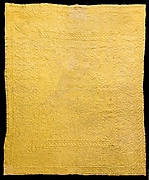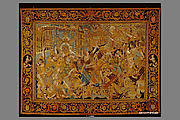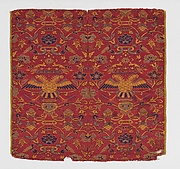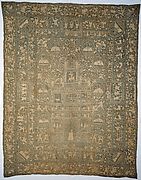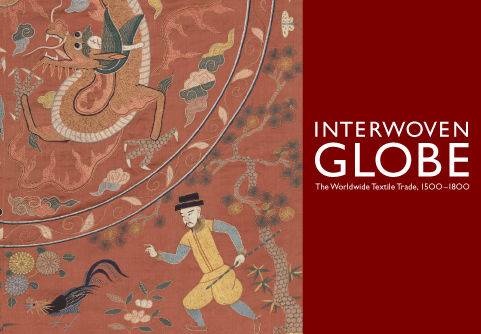
The
exhibition is made possible by The Andrew W. Mellon Foundation, the
Diane W. and James E. Burke Fund, The Coby Foundation, Ltd., The Favrot
Fund, the Gail and Parker Gilbert Fund, and the Quinque Foundation.
Exhibition objects
Interwoven Globe
The Worldwide Textile Trade,
1500–1800
September 16, 2013–January 5, 2014
Accompanied by a catalogue and an Audio Guide
Textiles
had been traded between Asia, the Middle East, Africa, and Europe for
hundreds of years, primarily along lengthy overland routes. In the
mid-fifteenth century, the fragmentation of the Mongol Empire triggered
heightened instability along the vast Silk Road. European trade with
Asia also suffered after 1453, when the Ottoman Turks captured
Constantinople. In the face of these disruptions, Europeans set sail in
search of an ocean route to the Spice Islands of Southeast Asia and
found valuable exotic textiles along the way. The newly discovered sea
routes directly connecting Europe to the rest of the world enabled the
creation of the first truly global trading community. As Europeans found
that textiles were welcome currency for other goods (including human
cargo in appalling numbers), the scope of the textile trade expanded
significantly.
Trade textiles, which, by definition, were produced by one culture to be sold to another, often reveal a conglomeration of design and technical features. New and exotic designs were imitated by craftsmen in the East and the West, stimulating markets and production. Trade textiles functioned as the primary objects that engendered widespread ideas of what was desirable and fashionable in dress and household decoration across cultures. They served as status symbols for their owners, advertising the wearer's sophistication and knowledge of the wider world. Highly accessible, these popular cloths influenced the material culture of the locations where they were marketed and produced, resulting in a common visual language of design recognizable around the world.
Trade textiles, which, by definition, were produced by one culture to be sold to another, often reveal a conglomeration of design and technical features. New and exotic designs were imitated by craftsmen in the East and the West, stimulating markets and production. Trade textiles functioned as the primary objects that engendered widespread ideas of what was desirable and fashionable in dress and household decoration across cultures. They served as status symbols for their owners, advertising the wearer's sophistication and knowledge of the wider world. Highly accessible, these popular cloths influenced the material culture of the locations where they were marketed and produced, resulting in a common visual language of design recognizable around the world.
Exhibition Programs (PDF)
Related Events
- Exhibition Tour—European Textiles in Interwoven Globe: The Worldwide Textile Trade, 1500–1800
- September 25, 2013 | Free with Museum admission, though tickets are required
- Art and the Emergence of the First Global Age
- September 28, 2013 | Fee: $25
- Discoveries—Fanciful Fabrics (Ages 18 and above)
- September 29, 2013 | Free, but reservations are required

